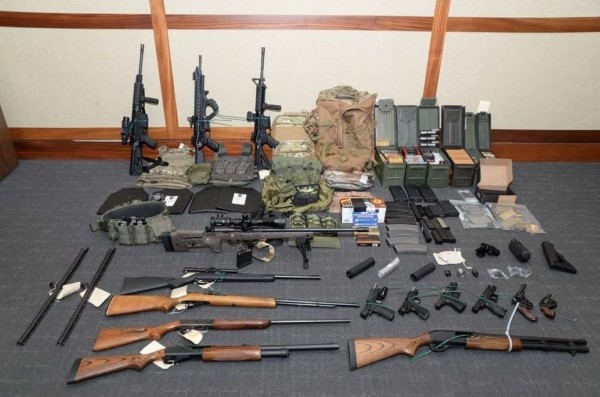

A prominent Democratic lawmaker is calling on the Pentagon to create a special inspector general to investigate the extent of white supremacists within the ranks as well as racial disparities in the military’s justice and promotion systems.
“The department has been talking about these problems for decades, nibbling around the edges, while too little progress has been made too slowly,” Rep. Jackie Speier (D-Calif.) told Task & Purpose. “Service members, such as one in Italy who plotted with neo-Nazis to attack his own unit, have been found to have white supremacist links. Racial disparities in representation among military personnel and in the military justice system have persisted for decades, with little or no progress.”
Racial disparities and white supremacists within the military have been long-standing problems. A 2019 Government Accountability Office report noted that African American and Latino service members are more likely to be investigated and sent to court-martial than their white counterparts.
And Air Force Staff Sgt. Steven Carrillo, who is accused of killing a sheriff’s deputy in California, is just one of the latest active-duty service members and veterans who have been linked to extremist groups.

However, the Defense Department appears to have little data about the extent to which extremists have infiltrated the military, Speier said. That is why she introduced an amendment to the House version of the Fiscal 2020 National Defense Authorization Act that would require an independent special investigator to provide Congress with a report on violent extremism and systemic racism.
“By requiring data and making that data public, we will be able to identify the problems and ensure that the spotlight of truth encourages real and effective change, not more hollow promises and meaningless platitudes,” Speier said.
Pentagon spokeswoman Lisa Lawrence said the Defense Department does not comment on Congressional proposals that are still under consideration, but she added that service members can be investigated and potentially disciplined if they violate DoD Instruction 1325.06, which prohibits troops from actively participating in extremist groups.
“Active participation includes, but is not limited to, fundraising; demonstrating or rallying; recruiting, training, organizing, or leading members; distributing material (including posting online); knowingly wearing gang colors or clothing; having tattoos or body markings associated with such gangs or organizations; or otherwise engaging in activities in furtherance of the objective of such gangs or organizations that are detrimental to good order, discipline, or mission accomplishment or are incompatible with military service,” according to the instruction, which was last updated in February 2012.
Related: ‘Racism is real in America’ — SecDef Esper condemns the killing of George Floyd
Still, just being a member of a white supremacist group is not enough to get kicked out of the military, defense officials told lawmakers in February.
Speier said she wants to address that loophole by updating the Uniform Code of Military Justice to include an article focused exclusively on violent extremism.
Bias & prejudice have no place in our military, or in our country. Prejudices – whether visible or invisible, conscious or unconscious—remain a burden to many. They hold back the diversity of the force, representation in our officer ranks, and experiences of our minority members. pic.twitter.com/uhScevfv9y
— Archive: Dr. Mark T. Esper (@EsperDoD) June 18, 2020
Since the death of George Floyd at the hands of Minneapolis police officers, top military leaders have announced they are taking measures that are meant to eliminate bias in how service members are disciplined and promoted.
In June, Defense Secretary Mark Esper announced he was standing up a “Defense Board on Diversity and Inclusion in the Military,” which will conduct a six-month study into how to increase diversity and equal opportunity within the ranks, especially among the officer corps.
“We are not immune to the forces of bias and prejudice – whether visible or invisible, conscious or unconscious,” Esper said a brief video to service members. “We know this bias burdens many of our service members, and has direct and indirect impact on the experiences of our minority members, the cultural and ethnic diversity of the force, and representation in our officer ranks. These things have no place in our military; they have no place in our country.”
The Army will delete indicators of service members’ race and gender and no longer require photographs for promotion boards starting on Aug. 1. The Navy has set up a task force to see if it should also stop including photographs in promotion packets.
In February, Marine Corps Commandant Gen. David Berger announced that Confederate symbols would be banned at all Marine installations. The Navy followed suit by prohibiting Confederate paraphernalia from public spaces and work areas. The Army was considering changing the names of bases named for Confederate commanders until President Donald Trump put an end to the effort.
Speier said she expects Senate Republicans will try to strip the amendment creating the special inspector general from the final version of the National Defense Authorization Act, but lawmakers in both the House and the Senate will fight to keep it.
“I would also add that amid this national outcry for a too long-overdue reckoning on systemic racism, and the very real threat these extremist groups present to our national security, it defies logic and decency that any member of Congress would oppose addressing these issues,” Speier said. “This can and must be done now.”
